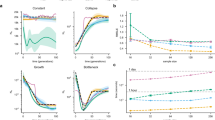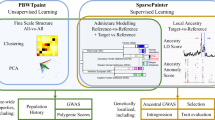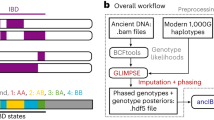Abstract
In an isolated population, individuals are likely to share large genetic regions inherited from common ancestors. Identity by descent (IBD) can be inferred from SNP genotypes, which is useful in a number of applications, including identifying genetic variants influencing complex disease risk, and planning efficient cohort-sequencing strategies. We present ANCHAP – a method for detecting IBD in isolated populations. We compare accuracy of the method against other long-range and local phasing methods, using parent–offspring trios. In our experiments, we show that ANCHAP performs similarly as the other long-range method, but requires an order-of-magnitude less computational resources. A local phasing model is able to achieve similar sensitivity, but only at the cost of higher false discovery rates. In some regions of the genome, the studied individuals share haplotypes particularly often, which hints at the history of the populations studied. We demonstrate the method using SNP genotypes from three isolated island populations, as well as in a cohort of unrelated individuals. In samples from three isolated populations of around 1000 individual each, an average individual shares a haplotype at a genetic locus with 9–12 other individuals, compared with only 1 individual within the non-isolated population. We describe an application of ANCHAP to optimally choose samples in resequencing studies. We find that with sample sizes of 1000 individuals from an isolated population genotyped using a dense SNP array, and with 20% of these individuals sequenced, 65% of sequences of the unsequenced subjects can be partially inferred.
Similar content being viewed by others
Log in or create a free account to read this content
Gain free access to this article, as well as selected content from this journal and more on nature.com
or
References
Powell JE, Visscher PM, Goddard ME : Reconciling the analysis of IBD and IBS in complex trait studies. Nat Rev Genet 2010; 11: 800–805.
Gusev A, Kenny EE, Lowe JK et al: Dash: a method for identical-by-descent haplotype mapping uncovers association with recent variation. Am J Hum Genet 2011; 88: 706–717.
Browning SR, Thompson EA : Detecting rare variant associations by identity-by-descent mapping in case-control studies. Genetics 2012; 190: 1521–1531.
Zeggini E : Next-generation association studies for complex traits. Nat Genet 2011; 43: 287–288.
Terwilliger JD, Weiss KM : Linkage disequilibrium mapping of complex disease: fantasy or reality? Curr Opin Biotechnol 1998; 9: 578–594.
Johnson G, Esposito L, Barratt BJ et al: Haplotype tagging for the identification of common disease genes. Nat Genet 2001; 29: 233–237.
Morris AP, Whittaker JC, Balding DJ : Fine-scale mapping of disease loci via shattered coalescent modeling of genealogies. Am J Hum Genet 2002; 70: 686–707.
Browning SR, Browning BL : Haplotype phasing: existing methods and new developments. Nat Rev Genet 2011; 12: 703–714.
Kong A, Masson G, Frigge ML et al: Detection of sharing by descent, long-range phasing and haplotype imputation. Nat Genet 2008; 40: 1068–1075.
Kong A, Steinthorsdottir V, Masson G et al: Parental origin of sequence variants associated with complex diseases. Nature 2009; 462: 868–874.
Hickey JM, Kinghorn P, Tier B et al: A combined long-range phasing and long haplotype imputation method to impute phase for snp genotypes. Genet Sel Evol 2011; 43: 12.
Palin K, Campbell H, Wright AF, Wilson JF, Durbin R : Identity-by-descent-based phasing and imputation in founder populations using graphical models. Genet Epidemiol 2011; 8: 853–860.
Browning BL, Browning SR : A fast, powerful method for detecting identity by descent. Am J Hum Genet 2011; 88: 173–182.
McQuillan R, Leutenegger AL, Abdel-Rahman R et al: Runs of homozygosity in european populations. Am J Hum Genet 2008; 83: 359–372.
Wilson JF, Weiss DA, Richards M et al: Genetic evidence for different male and female roles during cultural transitions in the British isles. Proc Natl Acad Sci USA 2001; 98: 5078–5083.
Vitart V, Biloglav Z, Hayward C et al: 3000 years of solitude: extreme differentiation in the island isolates of Dalmatia, Croatia. Eur J Hum Genet 2006; 14: 478–4876.
Polasek O, Marusic A, Rotim K et al: Genome-wide association study of anthropometric traits in Korcula Island, Croatia. Croat Med J 2009; 50: 7–16.
Browning SR, Browning BL : High-resolution detection of identity by descent in unrelated individuals. Am J Hum Genet 2010; 86: 526–539.
Duret L : Mutation patterns in the human genome: more variable than expected. PLoS Biol 2009; 7: e1000028.
Nachman MW, Crowell SL : Estimate of the mutation rate per nucleotide in humans. Genetics 2000; 156: 297–304.
Genovese G, Leibon G, Pollak MR, Rockmore DN : Improved IBD detection using incomplete haplotype information. BMC Genet 2010; 11: 58.
Myers S, Bottolo L, Freeman C, McVean G, Donnelly P : A fine-scale map of recombination rates and hotspots across the human genome. Science 2005; 310: 321–324.
International HapMap Consortium, Frazer KA, Ballinger DG, Cox DR et al: A second generation human haplotype map of over 3.1 million SNPs. Nature 2007; 449: 851–861.
Albrechtsen A, Moltke I, Nielsen R : Natural selection and the distribution of identity-by-descent in the human genome. Genetics 2010; 186: 295–308.
Gusev A, Kenny EE, Lowe JK et al: Low-pass genome-wide sequencing and variant inference using identity-by-descent in an isolated human population. Genetics 2012; 190: 679–689.
Acknowledgements
This work was supported by the Medical Research Council grant G0800604 to PM, and by MRC’s scholarship to DG. The ORCADES study was supported by a Royal Society fellowship for JFW, by the Chief Scientist Office of the Scottish Government Health Directorates, the EU Framework Programme 6 EUROSPAN award and by the facilities of the Wellcome Trust Clinical Research Facility, Edinburgh. The Croatian studies were supported by MRC and the Croatian Ministry of Science, Education and Sport. The SOCCS study was funded by Cancer Research UK Programme grant funder number C348/A12076.
Author information
Authors and Affiliations
Corresponding author
Ethics declarations
Competing interests
The authors declare no conflict of interest.
Additional information
Supplementary Information accompanies this paper on European Journal of Human Genetics website
Supplementary information
Rights and permissions
About this article
Cite this article
Glodzik, D., Navarro, P., Vitart, V. et al. Inference of identity by descent in population isolates and optimal sequencing studies. Eur J Hum Genet 21, 1140–1145 (2013). https://doi.org/10.1038/ejhg.2012.307
Received:
Revised:
Accepted:
Published:
Issue date:
DOI: https://doi.org/10.1038/ejhg.2012.307
Keywords
This article is cited by
-
Extensive genome-wide autozygosity in the population isolates of Daghestan
European Journal of Human Genetics (2015)



